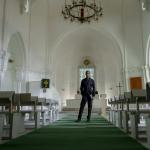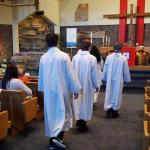Tribulation Force, pp. 402-403
In a rush at the end of this volume, Jerry Jenkins loses track of the narrative pattern he has followed up until this point.
For more than 800 pages he’s been alternating between the points of view of his two main characters, Rayford Steele and Buck Williams, revealing to readers only that which is seen or heard by each character in turn. That storytelling framework has shaped the plot of this second book in the series, with the first 400 pages of Tribulation Force consisting mainly of the author maneuvering his point-of-view protagonists into positions from which they will be able to witness and report on the events of the End Times check list as they unfold.
In Rayford’s case, that involved his taking a job as the personal pilot of the Antichrist. That was something he didn’t want to do — a step that seems inexplicable apart from the narrative convenience of putting him in a place where he’ll wind up trailing around behind Nicolae Carpathia. Rayford’s character hasn’t been so well drawn that we can really complain that his choice to work for Nicolae is “out of character,” but we can at least say that this choice develops his character more than anything else in this book.
That’s backwards. A character’s choices shouldn’t be dictated by the author’s narrative framework. Yet Jenkins was so devoted to this particular scheme that he was happy to change who Rayford seemed to be just to get him into a position where he could provide readers with an account of the actions of another character.
Jenkins’ determination to keep his POV characters in position has also meant, throughout this book, that neither Buck nor Rayford has been allowed to take any action that might jeopardize their continued proximity to Nicolae. Their role, as deployed by Jenkins, has been to observe the End of the World from the front-row seats he has reserved for them. They’re not allowed to act as heroes, only as spectators.
And that, in turn, has become an implicit theme of this series. It’s something these books teach. Jenkins’ slavish devotion to his alternating-POV narrative scheme aligns with Tim LaHaye’s fatalistic view that all human beings are mere pawns of prophecy. The characters of Rayford and Buck are held up as models for the Christian readers of these books to emulate, demonstrating what LaHaye seems to imagine is the main role for Christians in this world — to cozy up to power as spectators who never intervene or interfere.
So here we are in the final 50 pages of Tribulation Force, having slogged through 400 pages in which Jenkins did little more than line up airplane trips and phone calls to get his protagonists into position to be eyewitnesses to the actions of others. And after all that, Jenkins realizes he has too much ground left to cover and abruptly drops the pretense of sticking only to those two characters’ perspectives. Suddenly we’re reading the account of an omniscient, third-person narrator.
This new narrator scrambles to bring readers up to speed on what the new one-world religion pope has been up to during the 18-month time skip. “Pontifex Maximus Peter,” the head of the newly antichristened “Enigma Babylon One World Faith,” has been laying the groundwork for the persecution of “the Orthodox Jews” and “the new Christian believers” who converted through the stadium-tour evangelism of ex-Rabbi Tsion Ben-Judah and his opening act, Moses and Elijah.
[Pontifex Maximus Peter] had as much problem with the newly rebuilt temple and its return to the system of sacrifices as he did with the millions and millions of converts to Christ.
So the EBOWF, the new one-world religion, follows the same strange pattern established by the “Global Community” one-world government. We were told that Nicole’s OWG negotiated a treaty with Israel, with no explanation of why Israel remained a distinct and separate sovereign entity capable of signing such a treaty. Not only was this lone exception to the “one-world” of the OWG not explained, but the authors didn’t seem to see any need for such an explanation. This didn’t just convey the idea that Israel was unique or exceptional, but something more like the idea that Israel is alien — that it is something else, something that is excluded from the category of “every nation on earth.”
That same exclusion is echoed here as Nicolae, having just established a single, one-world religion to absorb and replace every religion on earth, then turns around and rebuilds the Jewish temple in Jerusalem.
Again we’re given no explanation for this contradiction, and no indication that the authors even realize it is a contradiction. But as the next paragraph illustrates, such contradictions seem to arise whenever the authors get to talking about Israel:
“Israel has rebuilt the temple to hasten the return of their Messiah,” Eli and Moishe had said, “not realizing that she built it apart from the true Messiah, who has already come! Israel has constructed a temple of rejection! Do not wonder why so few of the 144,000 Jewish evangelists are from Israel! Israel remains largely unbelieving and will soon suffer for it!”
Should any American politician offer even a slight, muted criticism of the nation of Israel, Tim LaHaye will be among those leading the charge to denounce them, demanding an apology. LaHaye loves Israel, he reassures anyone who will listen. He regards himself as one of its leading defenders and patrons and has raised vast amounts of money for lobbying efforts he describes as “pro-Israel.”
Yet here in LaHaye’s own words — in his book, in the mouths of characters who serve as his mouthpiece — we find a condemnation of Israel that goes far beyond anything that any of those LaHaye denounces as “foes of Israel” would ever say.
His complaint with Israel here, specifically, is that it’s full of Israelis. Israel would be perfect, he says, except that it’s crawling with Jews.
This is another instance of the passive-aggressive anti-Semitism we’ve seen running throughout these books. Other examples include the appalling stereotypes of Chaim and Tsion, and LaHaye’s variation of scapegoating John Birch Society conspiracy theories about “international bankers.”
LaHaye would likely defend himself from the charge of anti-Semitism here by pointing out that the heroes of this scene are themselves Jewish — great Jewish icons, in fact. I doubt it would be possible to explain to him in a way he would understand that portraying Moses and Elijah as the ones denouncing Jews as Christ-deniers doesn’t actually make the scene less anti-Semitic.
I will offer this, not in defense of LaHaye, but as context for this scene: When he says he loves Israel but condemns Israelis, he’s expressing the same attitude toward Jews that he regularly expresses toward Americans.
LaHaye’s responses to any questions about America depend on how you frame the question. Ask him about American exceptionalism, or about the faith of the founding fathers, or about St. Reagan’s “shining city on a hill” and he will gush enthusiastically about God’s special, chosen and uniquely blessed land. But if you pose the question in a way that mentions public schools, Social Security, health care or taxes, he will describe America instead as Sodom and Gomorrah, a wretched cesspool of sin, depravity, secularism, licentiousness and atheistic science.
Tim LaHaye loves America, but he hates Americans. And he feels exactly the same way about God’s other chose people.
For someone so obsessively concerned with Israel and “The Jews,” LaHaye is also oddly uninterested in learning or knowing much of anything at all about Judaism. I myself am no expert on Judaism. I could not begin to say what the development glibly mentioned above would mean. I can’t begin to imagine the ramifications for Judaism of a rebuilt temple and the restoration of the system of animal sacrifice as outlined in the Torah. But the not-very-much I have learned about Judaism is enough to know that it would be a massive and radical upheaval in the faith and practice of a people who have, over the course of nearly 2,000 years, developed a vibrant faith apart from those practices.
I don’t need to know all the details or all the far-reaching implications of that upheaval to recognize that the rebuilt temple would change everything.
Yet here, in Tribulation Force, the rebuilding of the temple and the resumption of animal sacrifice changes nothing.
The only significance of this development, as the authors describe it, is that Nicolae was on hand for the dedication, and that Moses and Elijah took time off their stadium tour to rail against this “temple of rejection.” Apart from that, and from it’s impact on tourism, the authors don’t seem to regard it as an especially significant change.
The day of the reopening, the new third-person narrator tells us:
Moishe and Eli made their way to the temple side of the Golden Gate. … Nicolae Carpathia had been among the cadre of dignitaries that day. He railed against the interlopers, but Eli and Moishe silenced even him. Without the aid of microphones, the two witnesses spoke loudly enough for all to hear, crying out in the courtyard, “Nicolae! You yourself will one day defile and desecrate this temple!”
Nicolae denies this, but since the authors seem to indicate that he and the rest of his “cadre of dignitaries” actually entered the temple, it seems like a moot point. Thanks to these visiting dignitaries, the place is already going to need to be reconsecrated.
“Nonsense!” Carpathia had responded. “Is there not a military leader in Israel with the fortitude to silence these two?”
The Israeli prime minister, who now reported to the Global Community ambassador of the United States of Asia, was caught on microphone and news tape. “Sir, we have become a weaponless society, thanks to you.”
This is included to clarify the political lessons being taught in the Left Behind series. Nicolae himself is, of course, a symbol of the importance of keeping government limited, tiny and impotent lest it usurp all freedom and become the Antichrist’s OWG. But here we’re reminded that this principle of limited government is itself limited and does not apply to military spending. Government should be limited when it comes to things like schools, highways, welfare, environmental protections and taxes on non-labor income. But it is vital that government’s ability to inflict lethal violence not be limited lest the government find itself unable to fulfill its crucial, God-given role of suppressing dissenting speech at gunpoint.
We also learn here that Israel has apparently been subsumed into the OWG as a sub-state of the Asian principality. So then what was that whole treaty-signing business about? Doesn’t that mean it was kind of like Canada signing a treaty with Alberta?
Eli and Moishe continued to shout, “God does not dwell in temples made with hands! The body of believers is the temple of the Holy Spirit!”
Once again the authors, afraid of writing too much original dialogue for these biblical characters, opt to have them recite scripture. And as usual, the authors decide to have Moses and Elijah recite scripture from the New Testament — here paraphrasing Acts 7:48 and 1 Corinthians 6:19.
It’s a bit frustrating that for all this recitation of the New Testament, “Moishe and Eli” never cite any of the numerous New-Testament passages in which the Golden Rule is taught as the summation of “the law and the prophets.” Here LaHaye and Jenkins have Mr. Law and Mr. Prophet speaking, and yet they never say diddly about loving your neighbor as yourself.
Carpathia, who had been merely trying to support his friends in Israel by honoring them for their new temple, asked the crowd, “Do you wish to listen to me or to them?”
The crowd had shouted, “You, Potentate! You!”
“Potentate?”
I think I get what Jenkins is shooting for here. Nicolae is the Antichrist, but that obviously won’t do as a title for public use. So what job title should the authors use for Nicolae’s new position as head of the OWG? They can’t call him an “emperor” because that might get readers thinking about all those passages in Revelation about the Beast and how they might apply to an emperor. That would come dangerously close to an orthodox, biblically literate reading of John’s Apocalypse, which would be disastrous for LaHaye’s alternative scheme. So instead Jenkins reaches for some other word for a supreme authority figure.
I’d have stuck with something biblical. The simple title “Lord,” for instance, would highlight the contrast between Christ and Antichrist. It’s also possible to imagine a frenzied crowd of Nicolae’s supporters shouting, “You, Lord! You!”
It’s possible to imagine that in just the same way it’s not possible to imagine such a crowd shouting “You, Potentate! You!”
















